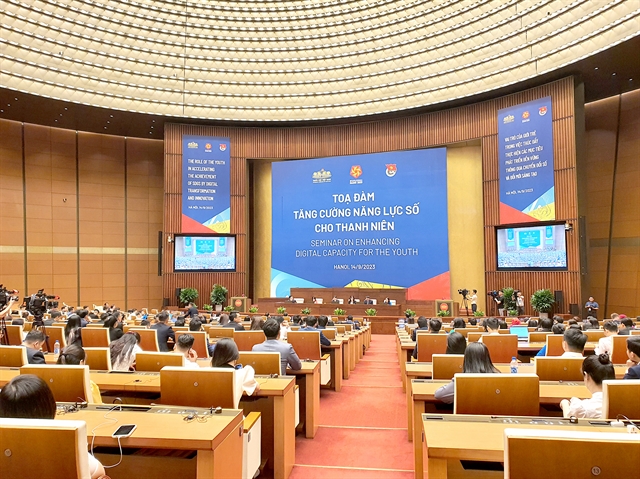 Politics & Law
Politics & Law

 |
| Delegates attend the seminar on the youth's digital capacity at the National Assembly Hall in Hà Nội on Thursday. — VNS Photo Nhật Hồng |
HÀ NỘI — Enhancing digital literacy ensures that young people are not only consumers but contributors to the digital transformation era, Inter-Parliamentary Union (IPU) secretary-general Martin Chungong said at a sideline event of the 9th Global Youth Parliamentarians Conference on Thursday.
Focusing on enhancing digital capacity for the youth, the event gathers officials and young entrepreneurs to discuss the best case practices and listen to young people's voices on how to engage them in the digital transformation and therefore the collective progress.
Noting how the world is going through a time of changes with various challenges from climate change to poverty, Chungong underlines the need for innovative solutions to mitigate these issues.
Including the youth of today, who are also digital natives, in that process is not only the right thing to do but also the smartest investment that can be made, he added.
"Young parliamentarians, in particular, are perfectly placed to be at the front of change, not only with the work at parliaments but also their engagement with young people in their community so they can empower them," said Chungong.
Sharing the same perspective, Bùi Quang Huy, the first secretary of the Hồ Chí Minh Communist Youth Union believed that the youth must be the driving force behind digital transformation, which is a pivotal target that needs enhanced digital capacity from individual citizens.
At the international level, the IPU itself is on the journey of transformation, said its secretary general Chungong, adding that many activities have been converted to online formats, including training for young parliamentarians.
Meanwhile, the growing use of social media and online votes means that there is progress in the adoption of growing technology among diplomats.
Miki Nozawa, head of the educational department of the UNESCO Office in Việt Nam also noted that the UN agency has promulgated a digital capabilities framework in 2018.
However, young representatives at the seminar noted that numerous challenges still remain in the course of digital transformation, including cyber threats to information and the different approaches needed to change digital habits and therefore digital capacity.
Dr Trương Thanh Tùng, head of the new medication research group from Phenikaa University said that it is particularly important to enhance digital transformation for young students and researchers, as this can increase their skills in independent research.
Recorded lectures, which the students can access and revise multiple times, have also shown to be significantly more active than traditional learning in the classrooms, he added.
He also noted that the youth now may be very tech-savvy, however, most of them are only proficient in entertainment applications rather than tools for studying.
As the workload at the higher education level is much heavier and different than that of general education, it would be too late if students only learn about these educational tools when they enter colleges and universities, Tùng said.
Technology plays a major role in increasing efficiency in studying and research, particularly with areas of research that have to work with huge databases, and therefore the knowledge and skills to put them into use must be trained.
Delegates at the seminar also pointed out that increasing digital transformation is also bringing up cybersecurity concerns related to personal, business and research data, and at a higher level, national secrets; as well as cyberbullying.
These are the issues that schools and officials must look into to have proper measures that protect young people from harm in the digital era.
Digital age skills
Citing an example of how ChatGPT is changing the way people work, particularly for those who are in the content creation business, Viettel Group Big Data Analytics Centre director Nguyễn Trần Ngọc Linh said: "I encourage young people to learn for life so that they can update on new technology and upgrade their skills with online tools and social media platforms."
She also noted that many corporations now open projects that students can join before graduation, which will help shape their skills and mindsets to be ready for the changes as they enter the workforce in the digital age.
Agreeing with Linh, head of the ecosystem development department (under the National Innovation Centre - NIC) Kim Ngọc Thanh Nga added that problem-solving and communication skills are crucial for the youth in the digital era.
The NIC has also been working with businesses to help students develop their science-technology ideas and solutions during their studying, offering free courses with Google to develop digital talents, and building an innovation network of Vietnamese intellectuals who are working at big tech corporations across the world.
Việt Nam has also deployed a pilot programme of "community digital technology groups", whose volunteers are helping locals to improve their digital literacy, whether it is for online shopping or using essential public services on online platforms. — VNS




